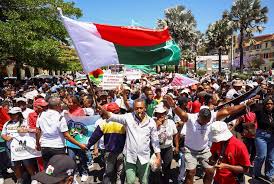After weeks of nationwide protests over power outages, water shortages, and rising living costs, Madagascar’s young generation — popularly called Gen Z — helped ignite a movement that has now reshaped the country’s leadership.
But as the dust settles after the army seized control, many young protesters are questioning whether their voices will truly be heard.
Earlier this month, thousands of young Malagasy citizens took to the streets demanding access to basic services and an end to government corruption. The demonstrations, which began as calls for better electricity and water supply, quickly grew into mass protests against President Andry Rajoelina’s leadership.
During one rally in Antananarivo, Colonel Michael Randrianirina, an elite army officer, joined the demonstrators and promised to protect them.
“He said, ‘We are for the people. We’ll help you,’” recalled Olivia Rafetison, 28, a leader of the Movement Gen Z Collective. “At that moment, we felt united — soldiers and civilians fighting for the same cause.”
But within days, the situation shifted dramatically. Colonel Randrianirina declared that the army was now in control, and President Rajoelina fled the country. Three days later, Randrianirina was sworn in as interim president, announcing that the military would govern alongside civilians for up to two years before organizing new elections.
Many young activists are torn between relief and uncertainty. While they welcomed the end of Rajoelina’s rule, they fear that another era of military leadership could silence their dreams for democratic reform.
“It went from protecting the people to taking power,” said Rafetison. “I’m not against it, but I’m conflicted. We fought for system change, not to swap one president for another.”
Madagascar’s Gen Z movement — made up of student groups, activists, and social media organizers — played a central role in mobilizing protests across cities. Their message was simple: they wanted jobs, affordable food, electricity, and water, not more political promises.
“We asked for water, electricity, and for every family to have enough to eat,” said Alicia Andriana from the Association of Dynamic Malagasy Students. “The army helped stop the violence, but the real struggle continues. We want a new system that works for the people.”
Madagascar, an island nation of 30 million people, has faced repeated coups and political crises since gaining independence from France in 1960. Despite vast natural resources, it remains one of the world’s poorest countries.
According to World Bank data, the country’s GDP per capita has nearly halved since independence, and many citizens live without reliable electricity or running water.
President Rajoelina himself came to power in a 2009 coup at age 34, making him one of the youngest leaders in the world at the time. However, years later, his government struggled to deliver meaningful improvements, leaving many young people disillusioned.
Transparency International’s vice chair, Ketakandriana Rafitoson, said the coup reflected deep frustration after years of government inaction and violent crackdowns on peaceful protests.
“Coups are never good for democracy,” she said. “But when leaders ignore people’s cries for help and use violence against them, it leaves the military as the only force able to stop the bloodshed — at least temporarily.”
Still, youth leaders insist they will not wait passively for change. Tolotra Andrianirina, 23, a Gen Z campaign spokesperson, said the movement will keep pushing for accountability.
“We can’t be sure the new government will listen,” he said. “But if they don’t, we’ll go back to the streets. We’ve done it once — we can do it again.”
Colonel Randrianirina’s interim administration has promised to restore stability, reopen civic spaces, and prepare for elections within two years. But for Madagascar’s restless youth, promises are not enough. They want action — access to water, power, jobs, and a say in shaping their country’s future.
As the world watches, the question remains: Will the new leadership honor the voices of the generation that made this revolution possible?



